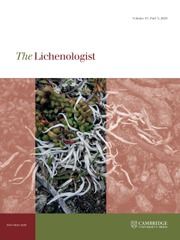Crossref Citations
This article has been cited by the following publications. This list is generated based on data provided by Crossref.
Hodkinson, Brendan P.
and
Hodkinson, Sarah Z.
2013.
Recent literature on lichens—230.
The Bryologist,
Vol. 116,
Issue. 3,
p.
316.
APTROOT, André
JUNGBLUTH, Patricia
and
CÁCERES, Marcela E. S.
2014.
A world key to the species of Pyxine with lichexanthone, with a new species from Brazil.
The Lichenologist,
Vol. 46,
Issue. 5,
p.
669.
Fernandes, Rafaella F.
Ferreira, Gilson R.
Spielmann, Adriano A.
Edwards, Howell G.M.
and
de Oliveira, Luiz Fernando C.
2015.
FT-Raman spectroscopy of the Candelaria and Pyxine lichen species: A new molecular structural study.
Journal of Molecular Structure,
Vol. 1102,
Issue. ,
p.
57.
Wijayawardene, Nalin N.
Hyde, Kevin D.
Rajeshkumar, Kunhiraman C.
Hawksworth, David L.
Madrid, Hugo
Kirk, Paul M.
Braun, Uwe
Singh, Rajshree V.
Crous, Pedro W.
Kukwa, Martin
Lücking, Robert
Kurtzman, Cletus P.
Yurkov, Andrey
Haelewaters, Danny
Aptroot, André
Lumbsch, H. Thorsten
Timdal, Einar
Ertz, Damien
Etayo, Javier
Phillips, Alan J. L.
Groenewald, Johannes Z.
Papizadeh, Moslem
Selbmann, Laura
Dayarathne, Monika C.
Weerakoon, Gothamie
Jones, E. B. Gareth
Suetrong, Satinee
Tian, Qing
Castañeda-Ruiz, Rafael F.
Bahkali, Ali H.
Pang, Ka-Lai
Tanaka, Kazuaki
Dai, Dong Qin
Sakayaroj, Jariya
Hujslová, Martina
Lombard, Lorenzo
Shenoy, Belle D.
Suija, Ave
Maharachchikumbura, Sajeewa S. N.
Thambugala, Kasun M.
Wanasinghe, Dhanushka N.
Sharma, Bharati O.
Gaikwad, Subhash
Pandit, Gargee
Zucconi, Laura
Onofri, Silvano
Egidi, Eleonora
Raja, Huzefa A.
Kodsueb, Rampai
Cáceres, Marcela E. S.
Pérez-Ortega, Sergio
Fiuza, Patrícia O.
Monteiro, Josiane Santana
Vasilyeva, Larissa N.
Shivas, Roger G.
Prieto, Maria
Wedin, Mats
Olariaga, Ibai
Lateef, Adebola Azeez
Agrawal, Yamini
Fazeli, Seyed Abolhassan Shahzadeh
Amoozegar, Mohammad Ali
Zhao, Guo Zhu
Pfliegler, Walter P.
Sharma, Gunjan
Oset, Magdalena
Abdel-Wahab, Mohamed A.
Takamatsu, Susumu
Bensch, Konstanze
de Silva, Nimali Indeewari
De Kesel, André
Karunarathna, Anuruddha
Boonmee, Saranyaphat
Pfister, Donald H.
Lu, Yong-Zhong
Luo, Zong-Long
Boonyuen, Nattawut
Daranagama, Dinushani A.
Senanayake, Indunil C.
Jayasiri, Subashini C.
Samarakoon, Milan C.
Zeng, Xiang-Yu
Doilom, Mingkwan
Quijada, Luis
Rampadarath, Sillma
Heredia, Gabriela
Dissanayake, Asha J.
Jayawardana, Ruvishika S.
Perera, Rekhani H.
Tang, Li Zhou
Phukhamsakda, Chayanard
Hernández-Restrepo, Margarita
Ma, Xiaoya
Tibpromma, Saowaluck
Gusmao, Luis F. P.
Weerahewa, Darshani
and
Karunarathna, Samantha C.
2017.
Notes for genera: Ascomycota.
Fungal Diversity,
Vol. 86,
Issue. 1,
p.
1.
Gupta, Pooja
and
Sinha, Gopal
2017.
Lichen Diversity in Sohelwa Wildlife Sanctuary, Uttar Pradesh, India.
Indian Journal of Forestry,
Vol. 40,
Issue. 2,
p.
201.
Yang, Mei-Xia
Wang, Xin-Yu
Liu, Dong
Zhang, Yan-Yun
Li, Li-Juan
Yin, An-Cheng
Scheidegger, Christoph
and
Wang, Li-Song
2019.
New species and records of Pyxine (Caliciaceae) in China.
MycoKeys,
Vol. 45,
Issue. ,
p.
93.


